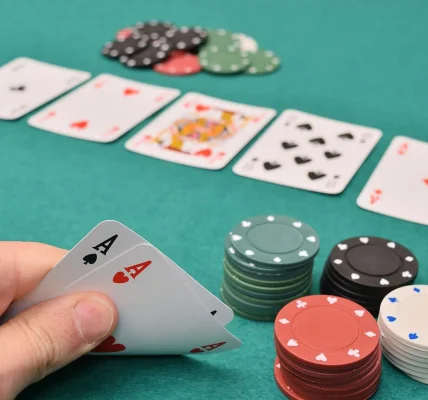No matter whether you play poker for fun or as a serious hobby, the game demands fast decision-making and an agile mind. Furthermore, poker tests your self control while helping build interpersonal skills and strengthening social ties.
Many people enjoy playing poker for the thrill of outwitting their opponents and outbluffing them, with the hopes that one day they may become world-renowned champions and make a living from it.
Game of chance
Poker has rapidly evolved beyond its roots in smoky backrooms and exclusive casinos to become a mainstream part of culture. Poker’s mainstream media coverage has amplified its strategic depth and psychological elements, drawing in audiences worldwide. From live tournaments to online platforms, it offers an immersive experience that pushes human limits.
Enhancing your poker skills requires taking an integrated approach that includes regular practice and research of advanced theories. Furthermore, watching and studying opponents’ betting patterns will allow you to learn their betting patterns more quickly – an observational skill which will enable you to identify mistakes more quickly while devising ways of dealing with them more successfully.
Though you can mitigate bad karma with advanced strategies, it is still essential to remember that even the best players will inevitably experience downswings over time. To stay afloat during these periods, understanding how large of a downswing you can tolerate is the key to survival, along with making sure your bankroll can weather any storm that might come your way. Knowing your opponents’ playing styles, patterns and potential hands is also critical for survival.
Game of skill
Poker’s integration into popular culture has helped it shed its stigma of gambling and become a legitimate form of entertainment and test of skill. Movies and television show have captured its strategic depth and psychological warfare battleground, creating a captivating subject matter. Online streaming further democratized it by connecting poker enthusiasts together while competing for real money prizes.
Poker’s intricate nature involves psychological insight and decision-making under uncertainty, along with mastery of poker leveling (examining your opponents’ playing styles and possible range of hands) in order to reduce luck’s role and enhance overall strategy. Even the best poker players may still experience downswings that make them doubt their skills; as poker rewards consistency over long timeframes while punishing mistakes immediately.
Game of psychology
Poker’s incorporation into popular culture has brought it to a wider audience. Representations in different media has brought to light its strategic elements while providing ample material for storytelling purposes – guaranteeing its place as one of the leading entertainment industries of tomorrow.
Poker has quickly become an entertaining activity that millions of people around the globe enjoy playing, from casual gamers to those following live tournaments on television or streaming services like Twitch or Youtube. Many believe they possess what it takes to beat professional poker players at this game.
However, they must be wary to avoid financial hardship, since unlike regular jobs, poker does not pay you for time off or holidays taken off from playing – this creates pressure to continue playing even when it is no longer profitable; such pressure may lead to addiction and delusions as a result of pressure to play poker even when not profitable.
Game of bluffing
Bluffing is an integral component of poker strategy. It can make even weak hands appear stronger, and force opponents off their hands and force them to call your bets. But when bluffing, beware – watch for eye movements of opponents who seem intent on reading you. If they appear drawn towards staring directly into your eyes or repeatedly checking their hand then that might be their way of trying to read you!
As for whether or not to bluff, take into account the betting history, your position and strength of hand when making this decision. Don’t allow an unsuccessful bluff to change your game plan; rather learn from mistakes made and move forward playing well. Additionally, tilting can diminish confidence levels significantly and make detecting future bluffs difficult.






